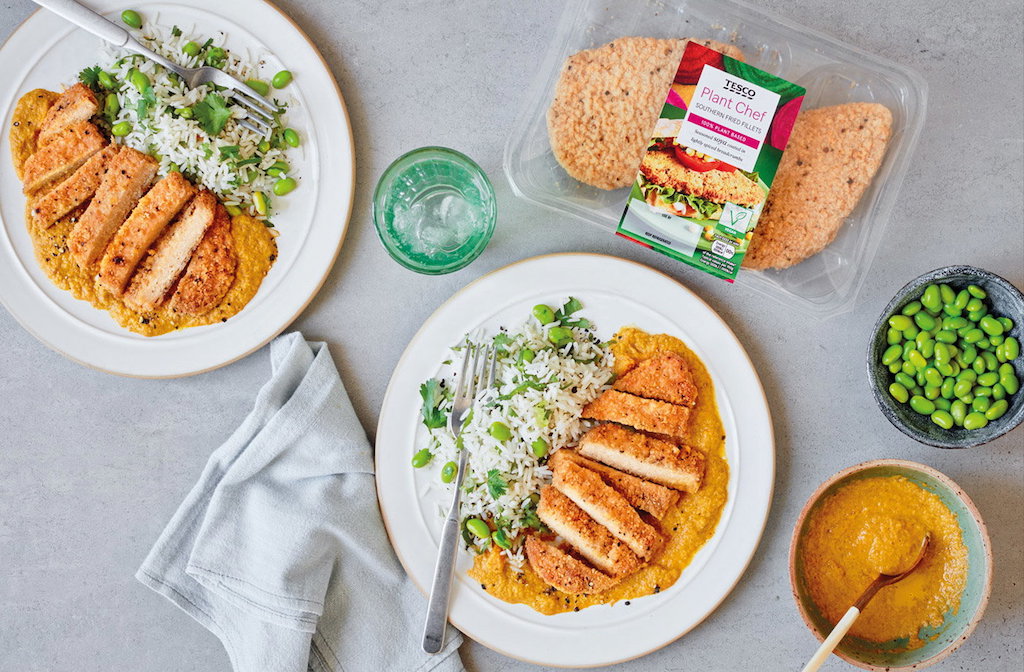Plant-Based Pioneer: Tesco Pledges 300% Sales Increase For Meat Alternatives Within 5 Years
4 Mins Read
British supermarket giant Tesco has committed to a 300% sales boost for plant-based meat alternatives within the next five years, making it the first retailer in the U.K. to set a sales target for the category. The pledge is a part of the company’s wider sustainability measures developed with charity partner WWF to try and halve the environmental footprint of groceries in the country.
In a first for the U.K., Tesco has set a five-year commitment to increase sales of plant-based meat alternatives by 300%. In order to reach this target, the retail giant will be introducing more plant-based products across 20 different categories in all its stores and reduce prices to ensure that affordability is not a barrier to plant-based sales. Tesco also says that it will be working with suppliers to innovate new products and provide a meat alternative wherever a meat version is featured.
This is part of the company’s broader sustainability ambitions that were previously developed with WWF to halve the environmental impact of the average shopping basket in the country.
Our transparency on protein sales and our new sales target for meat alternatives gives us the platform to becoming more sustainable and will provide customers with even more choice.
Dave Lewis, CEO of Tesco

“It’s great to see this sector-leading step from Tesco. Tackling the environmental impact of what we eat and how we produce it has never been so urgent,” said Tanya Steele, CEO of WWF. “In the last 50 years, wildlife populations have declined on average by 68%. The food system has been identified as the biggest culprit, but also presents one of the greatest opportunities to reverse this trend [and] rebalancing our diets is a critical part of that.”
At the centre of our broken food system is meat and dairy production, is responsible for almost a fifth of global greenhouse gas emissions and has an enormous impact on the world’s precious habitats including the Amazon rainforest. A recent report from Oslo-based nonprofit EAT found that if the 20 biggest economies significantly reduced meat and dairy consumption, as much as 40% of the total global carbon budget for food could be freed up.
In another first for the food retail industry, Tesco has also pledged to publish the sales of plant-based protein as a percentage of its overall protein sales each year. The move will be a crucial to track progress and could have a major domino effect to pressure other major industry players to make similar commitments to transparency.
“Our transparency on protein sales and our new sales target for meat alternatives gives us the platform to becoming more sustainable and will provide customers with even more choice,” said Dave Lewis, CEO of Tesco.
It’s great to see this sector-leading step from Tesco. Tackling the environmental impact of what we eat and how we produce it has never been so urgent In the last 50 years, wildlife populations have declined on average by 68%. The food system has been identified as the biggest culprit, but also presents one of the greatest opportunities to reverse this trend [and] rebalancing our diets is a critical part of that.
Tanya Steele, CEO of WWF

“Food businesses cannot have a sustainable future without transparency. They need to know where they are starting from in order to know where they are going,” added Steele. “Our partnership with Tesco aims to halve the environmental footprint of the average shopping basket, but we need a sector-wide step-change in transparency and accountability to achieve the scale and pace of change that is so desperately needed. We ask all food businesses to join us on this journey.”
Earlier this year, a report by collaborative investor network FAIRR found that nearly half of the world’s biggest food retailers are now all setting up dedicated teams to develop and sell plant-based products in response to mainstream demand. According to the analysis, Tesco and Unilever topped the ranking for its commitment to shift its portfolio towards plant-based foods.
This isn’t the only initiative that the British retail giant has launched to meet growing calls for companies to take sustainability seriously. In July, Tesco partnered with circular packaging e-commerce platform Loop to launch a circular delivery service, marking the first time the U.K. has seen groceries in reusable containers made available to consumers.
Lead image courtesy of Tesco.




